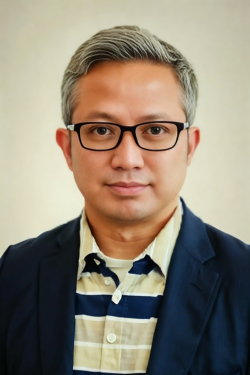Al and Global Challenges: Ethical Development and Responsible Deployment
CCIT / CAST | EC MEDICI Framework | ICT Watch - Indonesia | Jaipuria Institute of Management Noida | Kamusi Project International | Virtual Activism | Loughborough University
Session 199
The emergence of AI within the Global South is a pressing issue that has yet to come with the consent or participation of the vast majority of the population. Proponents of AI technology have the stage and the resources to press forward with few restrictions. However, most people remain voiceless about developments that affect their lives and livelihoods.
Recognising that a discussion at a high-level panel at a WSIS summit is many layers removed from the input and experiences of most people who stand to be affected by the implications of technologies in which they have no voice, the panel nevertheless seeks to promulgate consideration by those in positions of power and influence around these urgent thematic questions:
- To what extent is the pursuit of AI a correct or necessary approach to addressing SDGs in the Global South
- Who controls the pursuit of AI, and to what extent is that driven by altruism or the quest for power or profit
- To what extent is AI an imposition of the values and norms of the societies at the forefront of its development
- How can these technologies be steered toward the benefit of people without control over them, and who cannot opt-out?
- How can people be protected from extractive or coercive use of AI technologies?
- Are there opportunities for multistakeholders to steer the evolution of AI from below, or is it inherently determined by the people who control the levers?
Source person (alphabetical order):
- Alfredo M. Ronchi (EC MEDICI Framework, polimi.it)
- Anuja Shukla (Jaipuria Institute of Management Noida, jaipuria.ac.in)
- Donny B.U (ICT Watch - Indonesia, ictwatch.id)
- Marlyn Tadros (Virtual Activism, virtualactivism.org)
- Martin Benjamin (Kamusi Project International, kamusi.org)
- Waley Wang (CCIT / CAST, english.cast.org.cn)
- Nick Hajli (Professor of Digital Strategy at Loughborough Business School)

Prof. Alfredo Ronchi, Secretary GeneralEC MEDICI framework.
Alfredo M. Ronchi is a professor at Politecnico di Milano (Engineering Faculty), an Expert/advisor in eServices, the Head of the JRC S2D2 (Safety, Security, Defence, Disaster Recovery and Management), the Secretary of the EC-MEDICI Framework of Cooperation, a delegate at UNESCO IFAP, and an active member of the WSIS since its establishment (2003-/).
Mr Ronchi is a member of the following Boards: Member of AI&Society board (Springer Nature), Board of Directors Global Forum (France), Member Emeritus World Summit Award Board of Directors (Austria), Board of Directors European Education New Society Association (ENSA France). Member of the Keio University NoE (Japan). Member of the Advisory Board of the School of Law under the aegis of GD Goenka University (New Delhi, India).
He has cooperated as an organizer or programme chair in W3C, ACM, IEEE, and ITU-WSIS conferences; for more than thirty-five years, he has organized and managed international projects, conferences, and workshops. He is the author/contributor of more than 400 papers and various books on e-culture, e-government, e-safety and security, and e-services.

Anuja Shukla is working as an Associate Professor at Jaipuria Institute of Management, Noida. She has over 12 years of teaching experience with over 24 paper publications. Her research articles have been published in journals of repute, such as the International Journal of Information Management, Psychology and Marketing, Journal of Research in Interactive Marketing, VISION, and FIIB. She has also won best research paper awards at FMS, Symbiosis, and Amity. Her areas of research interest include eWOM, Consumer Behavior, m-Commerce, AR/VR, and emerging technologies.

https://www.linkedin.com/in/donnybu
Donny B.U. (Mr.) is co-founder of ICT Watch in 2002, the leading Indonesian Information and Communication Technology (ICT) civil society organisation (CSO) that laid the foundation for digital literacy through the nationwide campaign. He was awarded an Ashoka fellowship in 2012 for his social entrepreneur activities focusing on online freedom of expression and cyber activism. He is also a co-initiator of the Indonesia Internet Governance Forum (ID-IGF), a national platform for multistakeholder dialogue. He previously taught cyber journalism, digital media, e-business, and communication technology development at several reputable universities in Jakarta. He started his career as an ICT journalist at Detikcom in 1999, Indonesia's most prominent online media. He finally served the company as Vice President (VP) until his resignation in 2010. He travels widely in Indonesia to share his ideas and experiences with various campus activists, civil societies and communities. He actively engaged in IGF and the World Summit on the Information Society (WSIS) while holding a mandate as a Chairperson of Siberkreasi, the Indonesian Digital Literacy National Movement, and an expert staff to the Indonesian Vice Minister of Communication and Information Technology until now. He may be contacted via email at dbu [at] donnybu.id

Professor of Media Arts and Communication at Southern New Hampshire University and founder and executive director of Virtual Activism which deals with the intersection of technology and human rights and closing the digital divide. .
Tadros was a Research Affiliate at the Middle East Center at Northeastern University and was also a Visiting Scholar in their Women’s Department. She taught human rights and Middle East Studies at the Political Science Department. In addition, she was a Visiting Fellow at the Human Rights Program at Harvard University.

Trained as an anthropologist with a focus on international aid in Africa. Transitioned to computational linguistics, running Kamusi to develop language technology with a focus on marginalized languages and serving as a delegated emissary for the African Academy of Languages (African Union) for language technology. Side hustle as a content creator, especially regarding AI, language technology, and linguistic equity issues, at http://youtube.com/@pirateprofessor

Waley Wang is a researcher with over ten years of experience in AI engineering and decision intelligence, and he is now a founder and chairman of WengeTech.&D2 Intelligence abroad since 2017. Now Wenge Tech. The corporation has grown to one of the top cognitive and decision intelligence companies. He and his team are dedicated to developing enterprise AI products, including large language models, multimodal models and domain-specific AI platforms to improve operations efficiency and productivity, especially in media, finance, healthcare, and other industries. The company has about 800 employees, providing AI products and services for thousands of government and enterprise users.

Professor Nick Hajli is an AI Strategist and a Professor of Digital Strategy at Loughborough Business School. He earned his PhD in Management from Birkbeck, University of London. With a notable presence in academic circles, Nick boasts a portfolio of 100 publications in esteemed journals. His research has garnered recognition in leading publications like the FT50 and ABS 4 journals. He has received prestigious accolades including recognition as one of the top 2% scientists globally by Stanford and as a highly cited author worldwide by Elsevier.
-
 C1. The role of governments and all stakeholders in the promotion of ICTs for development
C1. The role of governments and all stakeholders in the promotion of ICTs for development
-
 C4. Capacity building
C4. Capacity building
-
 C5. Building confidence and security in use of ICTs
C5. Building confidence and security in use of ICTs
-
 C10. Ethical dimensions of the Information Society
C10. Ethical dimensions of the Information Society
-
 C11. International and regional cooperation
C11. International and regional cooperation
The session delves into the pervasive influence of artificial intelligence (AI) and digital technologies globally, explicitly focusing on ethical considerations and the digital divide impacting cultural identities and societal structures. It underscores that while AI has the potential to revolutionize various sectors, it also poses significant risks, including biases and privacy violations, that can disproportionately affect vulnerable populations. The discussion underscores the critical need for ethical guidelines and responsible governance to mitigate its negative impacts.
In discussing the global implications of AI, the discussion raises concerns about the homogenization of content distributed via the internet, potentially threatening cultural identities. It critiques the predominance of data from Western countries in training AI systems, which could lead to outputs that reflect Western biases. This concern ties into broader issues of technological equity, as the document also addresses the risks of AI in perpetuating existing power structures and its potential to exacerbate inequalities between the Global North and South.
The multistakeholders in Global South have been active in shaping ethical AI deployment through policies and focus group discussions. These efforts aim to ensure AI's alignment with societal values and the safeguarding of fundamental rights. The discussions focus on various themes, including youth development, child protection, societal engagement, linguistic inclusion and women's empowerment, reflecting a comprehensive approach to understanding and directing AI's impact.
Finally, the text connects to the World Summit on the Information Society (WSIS) action lines by emphasizing the need to bridge the digital divide and ensure equitable access to information and communication technologies (ICTs). It advocates for integrating Sustainable Development Goals (SDGs) into the WSIS framework, highlighting the importance of sustainability, empowerment of marginalized communities, and inclusive participation in the digital economy. The session calls for a balanced approach to AI development, which considers both the opportunities and the ethical challenges and resonates with the WSIS's objectives to harness the potential of ICT for advancing human rights, alleviating poverty, and fostering inclusive societies.
-
 Goal 4: Ensure inclusive and equitable quality education and promote lifelong learning opportunities for all
Goal 4: Ensure inclusive and equitable quality education and promote lifelong learning opportunities for all
-
 Goal 5: Achieve gender equality and empower all women and girls
Goal 5: Achieve gender equality and empower all women and girls
-
 Goal 10: Reduce inequality within and among countries
Goal 10: Reduce inequality within and among countries
-
 Goal 16: Promote just, peaceful and inclusive societies
Goal 16: Promote just, peaceful and inclusive societies
The session discusses several critical issues related to the pervasive influence of the internet and artificial intelligence (AI) on global culture, ethics, and societal norms, particularly highlighting the consequences for cultural identities and security. The discussion emphasizes the risks associated with AI, such as potential violations of fundamental rights and the challenges in distinguishing human-generated content from that produced by AI. The ethical dilemmas surrounding AI use and its societal impacts, including replacing traditional cultural regulators with automated algorithms, are critically examined.
Furthermore, the session will also highlight AI governance on empowering specific groups through AI, such as youth, children, women, and broader society, and align with several Sustainable Development Goals (SDGs). For instance, their initiatives contribute to SDG 4 (Ensure inclusive and equitable quality education and promote lifelong learning opportunities for all), SDG 5 (Achieve gender equality and empower all women and girls), and SDG 16 (Promote justice, peaceful and inclusive societies).
While AI offers significant benefits, it also presents substantial risks that need careful management. The session advocates for a balanced approach to AI development that considers ethical dimensions and promotes inclusivity. This aligns with the SDGs by emphasizing the need for equitable access to technology, addressing the digital divide, and ensuring that AI advancements contribute positively to sustainable development and empower marginalized communities. The dialogue around technocolonialism further enriches this discussion, questioning the imposition of AI technologies on the Global South by external forces, thus highlighting the need for local engagement and the development of contextually relevant technological solutions.
The session will also discuss how AI is being leveraged in various sectors like manufacturing, traditional Chinese medicine, and education to enhance productivity and social development. This perspective underscores the positive impacts of AI, such as improving operational efficiency and aiding in decision-making processes. However, it also acknowledges the challenges, including AI biases, privacy concerns, and security risks, particularly affecting vulnerable populations such as women and children.